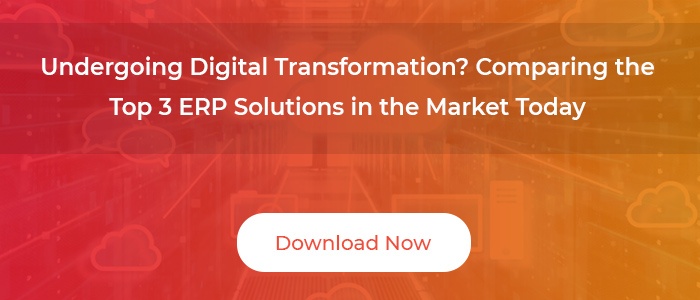

July 7, 2020 - by Synoptek
Embarking on the digital transformation journey is no longer a question of if, but when! With the right approach, it can revolutionize how businesses operate: from unifying data and unearthing new insights to empowering employees and enhancing customer experiences.
According to research firm IDC, enterprises will globally invest $2 trillion on digital transformation by 2022. Since staying current and ahead of competition includes ensuring that your business has digitally aged well, it is imperative that COOs address (and answer) several digital transformation assessment questions – especially with respect to their ERP systems.
A report by McKinsey reveals that 70% of large-scale digital transformation programs fail to meet targets, resulting in huge monetary losses. This makes it extremely critical for COOs to get into action and steer the project in the right direction and achieve successful application implementations. With the right approach to ERP digital transformation, COOs can:
Although it is an exciting time for organizations to embark the digital transformation journey, beginning on the right foot requires COOs to not just think about what technologies to implement (or get rid of), but also address some important questions regarding the project such as understanding digital transformation goals, addressing employee anxieties and reservations, planning for massive process changes, and more.
Answering these digital transformation panel questions in time can help organizations in several ways; it can enable COOs to:

ERP digital transformation payoffs can be extremely beneficial for companies, completely changing how they conduct day-to-day operations. However, given how complex and time-consuming such projects can be, aligning ERP digital transformation with the overarching business strategy is critical to success. Here are 5 essential ERP digital transformation panel questions COOs must answer:
There is no doubt that ERP digital transformation projects can bring a lot to the table, but it’s not just about implementing a handful of new technologies. Successful implementations entail more than simple technology replacements; they need COOs to have a clear vision of how they expect the technology to transform the business.
Before starting the implementations process, COOs must determine the need for an ERP system: Does the organization need an ERP system to improve operations? Enhance data access? Boost employee engagement? Enable top-line revenue growth?
ERP digital transformation projects set the foundation of massive process improvements across the enterprise organization; they introduce several best practices to enhance efficiency, improve performance, and maximize value from modern technology. However, achieving digital transformation with ERP requires COOs to do a lot more than simply selecting and implementing a technology system.
It requires them to understand the changes that need to be made to accommodate the new technology: What happens to existing systems. Are massive process changes needed? Does the organization have to prepare for downtime during the implementation process?
After defining what changes need to be made to support the ERP, it is essential that COOs assess the risk tolerance for change and have an effective risk/change management process in place prior to beginning the transformation.
Given the number of changes that an ERP can bring about, it is important for COOs to understand the magnitude of change as well as the risks associated; they need to build a robust organizational change strategy and communicate changes and training plans, so users can be aware of and prepare accordingly.
When it comes to implementing an ERP system, many organizations only include license costs into their ERP budget – not realizing that an ERP system entails much more than just license costs. COOs need to be aware of all the costs to prepare an all-encompassing optimized budget; this includes implementation, implementation partner, post-implementation support and maintenance, and training costs.
This will help the organization allocate the right amount of budget while ensuring there are no project delays due to budget issues.
ERP transformation projects are extremely complex and time-consuming. COOs looking to drive ERP success need to be aware of every task that needs to be performed: from building a business case, creating a project plan or roadmap, evaluating vendors, finalizing an implementation methodology, implementing the project, and supporting and maintaining it post implementation.
COOs also need to take into account aspects such as system or process upgrades as well as data assimilation and migration.
Given the benefits of transforming digitally, organizations across the world are driving efforts in embracing new-age ERP systems to modernize their infrastructure, enhance data management, and improve the way employees use data for business decision-making. Implementing a modern ERP system is a great way to enable (and sustain) innovation.
But despite best efforts, a lot of investments in digital transformation fail. This makes it extremely critical for COOs to build a clear strategy and direction – to avoid the confusion and complexity that comes with ERP digital transformation. Addressing some important digital transformation panel questions is a critical aspect of ensuring the transformation is timely, precise, and within budget.
Interested in implementing an ERP system to support your digital transformation process? Contact a Synoptek expert today.

